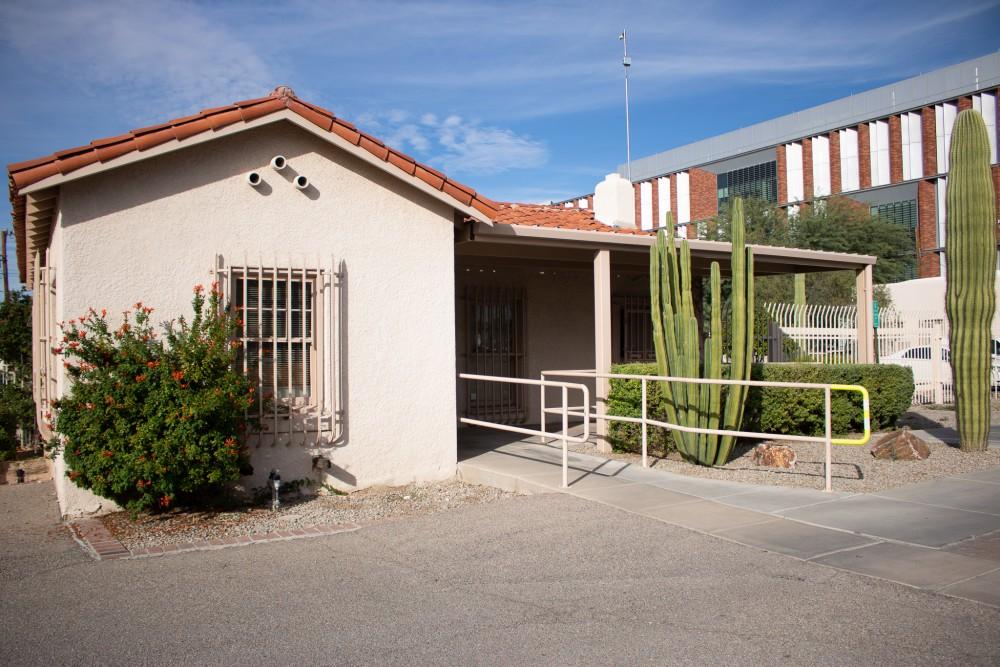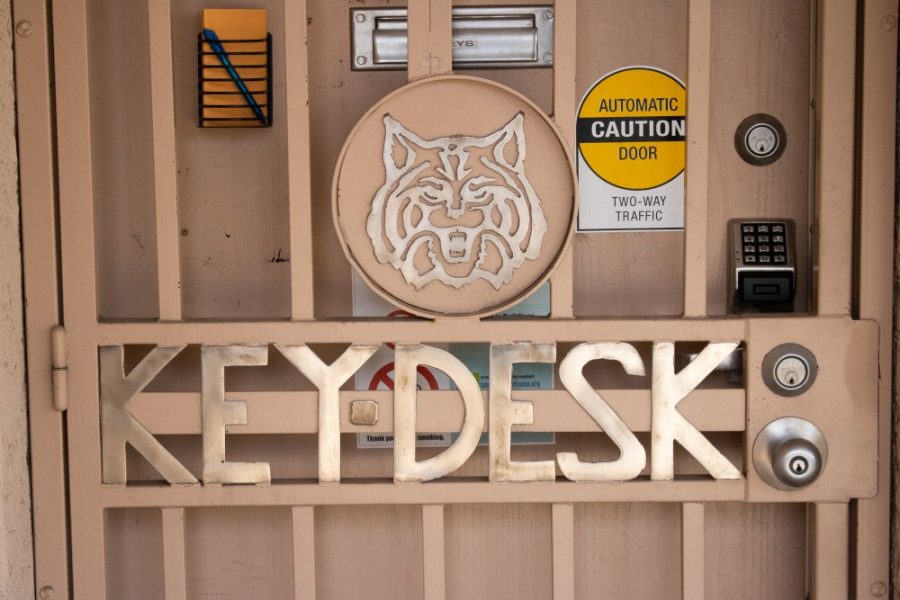In modern society, everything of necessity and importance has a lock and key. The people at the University of Arizona Lock Shop work behind-the-scenes out of old town houses to guarantee security.
The Lock Shop cuts the keys—a small band of locksmiths maintain the locks and keys to everything on campus and in affiliation with the UA.
Dustin Taylor, supervisor of the Lock Shop, holds the literal keys to the university.
“I am the conductor of the orchestra,” Taylor said. “All the people in lockshop and the key desk, they are my flute players and my violinists and I am there to conduct so they can do the best job that they can.”
According to Taylor, the Lock Shop cuts upwards of 5,000 keys every year.
RELATED: ‘Tell the team to Bear Down’
Keys are made of brass, so they have a certain life expectancy. Depending on how much they are used, they can last anywhere from six months to more than 20 years, according to Taylor.
The Lock Shop has several machines for cutting and refurbishing different manners of key, like duplicating machines and code-cutting machines, which allows locksmiths to manually cut individual grooves into a key if they know the code for that particular lock. Other machines are designated for more high security keys, which tend to be very precise.
“There are a lot of things that need keys and until you need one yourself, nobody thinks about it too much,” Taylor said.
The Lock Shop does not just make keys for all the doors on campus, but for everything—filing cabinets, lockers, golf carts, electrical panels, panels for plumbing accesses, machines and lab equipment.
“If I do my job right, peoples experiments are secure, their purses are secure, their lunches are secure, their offices are secure, their research is secure,” Taylor said.
Ten years ago, the Lock Shop operated out of trailers and parking garage offices, but today they work communally from a small townhouse.
“It’s very surprising how you can turn an older house that once had a family living in it or something into a lockshop and a key desk, it’s got a different life now,” Taylor said. “It makes for an interesting workspace.”

In the old living room is the admin assistant and four locksmiths, each with their own workstation. A fireplace goes unused except for the tools that cover the mantle, acting as a locksmith’s shelving system.
There are three bedrooms—one has been converted into an Taylor’s office and the other two are home to four more locksmiths.
“Like many other trades, locksmiths are known packrats,” Taylor said. “We’re a very industrious bunch that likes to keep everything just in case we need it again. It doesn’t look like a hoarders house, but we do have our share of parts.
The unique workspace provides for a very community oriented and educational environment known to Taylor as the “Locksmith University”.
“It’s kind of a joke [around the shop], to see if you can measure up to the Locksmith University, because we have a lot of locks on campus. It’s just a wonderful learning experience, the trade aspect of it,” Taylor said. “Whatever you thought you knew on the streets [about locksmithing] or at your former job—forget it, because when you come here, this is where you become a real locksmith.”
RELATED: ‘Strength of UA traditions’ reunites Wildcats
Though small, the Locks Shop has a very diversely specialized group of locksmiths.
“We’re all locksmiths, but we all had a particular field that we excelled at in the outside world,” Taylor said.
Taylor himself has a prison background, having worked as a locksmith for 19 years at the Department of Corrections.
“I could help you in and out of prison all day long,” Taylor said.
One gentleman is considered by many in the locksmith community to be an expert at repairing safes—and opening them too.
Another man is a genius of automotive and cabinetry locks—he can look at a key and tell where it came from, who made it, the year that it was manufactured and how to open it.
“All of us have talked enough to where there is not much we couldn’t get into,” Taylor said. “Or out of, for that matter.”
The locksmiths of the UA are a talented but “forgotten lot”, said Taylor. Locksmithing is not an incredibly rewarding field, and few think about who made their daily routine possible, but there is a greater appeal.
It’s a down-to-earth career. Taylor relishes the independence over his stations he is afforded as supervisor, given all the tools, people and money he needs to get the job done, no matter the obstacle.
The community, too, is kind and a reward in itself.
“It helps a bad situation not be so bad when you have a group of people who will help you when you need it,” Taylor said. “That’s the best part of the day, this community that we have.”
And in a world where jobs are becoming increasingly automated, often at risk of disappearing with the implementation of robots, locksmithing seems safe from the grips of newer technology.
“You just can’t beat a good old fashioned key,” Taylor said.
Follow Daily Wildcat on Twitter









